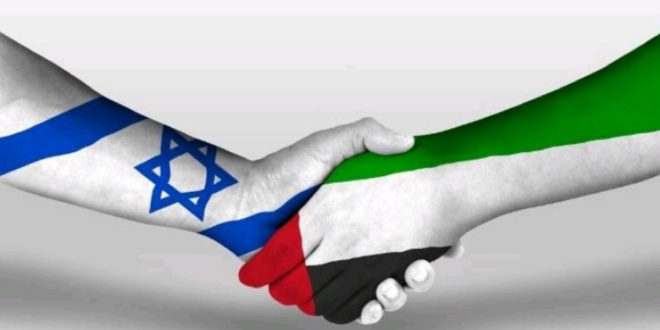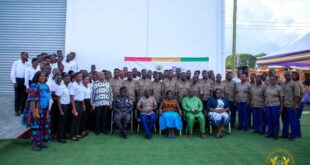Author: Samuel Shay is an International Business Expert and Chairman of leading Israeli tech firm, Gulf Technologies Systems
As my activities in the Gulf region increase, the need for future cooperation between Israel and the United Arab Emirates, (UAE) emphasizes the importance of policy changes, required from the UAE government regarding local investment, to develop new industries and projects in partnership with the Israeli private sector.
my analysis underscores the significance of a strengthened bilateral relationship, and potential economic and technological benefits, and provides recommendations to further enhance cooperation between the two countries.
The normalization of diplomatic relations between Israel and the UAE under the Abraham Accords in 2020 has opened up a range of opportunities for cooperation in various fields, including technology, security, agriculture, healthcare, and education. I try to analyze the requirements for future cooperation and the policy changes the UAE government needs to facilitate local investment and encourage collaboration with the Israeli private sector.
A strong partnership between Israel and the UAE can unlock significant economic potential for both countries. The UAE can benefit from Israel’s expertise in agriculture, cybersecurity, and water management, while Israel can access the UAE’s vast financial resources and investment opportunities. This collaboration can lead to increased trade, job creation, and overall economic growth.
Israel is renowned for its innovative technology ecosystem, often referred to as the “Start-Up Nation.” Through collaboration with the UAE, Israeli companies can gain access to new markets, while UAE-based businesses can leverage Israeli technological advancements to improve their operations and services.
Enhanced cooperation between Israel and the UAE can contribute to regional stability and security. Both countries share common strategic interests in countering threats posed by extremist groups and ensuring stability in the Middle East. By working together, they can strengthen their position in the region and foster a more secure environment.
The UAE government should revise its legal and regulatory framework to create a more conducive environment for Israeli-UAE investments. This includes easing restrictions on Israeli companies, simplifying visa processes, and ensuring the protection of intellectual property rights. A transparent and predictable legal system will encourage more Israeli companies to invest in the UAE with local businesses’ cooperation
To attract Israeli investors, the UAE government should offer financial incentives and support, such as tax breaks, grants, favorable loan terms, and join investment programs. These incentives can reduce the barriers to entry for Israeli companies and encourage investment in new industries and projects.
The UAE government should actively facilitate networking and matchmaking opportunities between UAE and Israeli businesses. This can be achieved through organizing joint trade shows, conferences, and business forums, as well as promoting the exchange of business delegations.
promoting joint research and development initiatives between UAE and Israeli institutions, focusing on sectors such as renewable energy, artificial intelligence, and biotechnology. This will enhance knowledge transfer and facilitate the development of new technologies and innovations.
prioritize investment in high-tech industries such as renewable energy, cybersecurity, artificial intelligence, and biotechnology. These industries have significant growth potential and can lead to the creation of high-value-added jobs.
encouraging collaboration between Israeli and Emirati startups through joint incubator and accelerator programs. This will enable startups from both countries to access resources, mentorship, and funding opportunities, fostering innovation and creating new business opportunities.
establishing special economic zones (SEZs) specifically designed for Israeli companies with high technological profiles. These SEZs can offer a range of incentives, such as tax breaks, simplified regulations, and streamlined licensing procedures, making it easier for Israeli businesses to establish a presence in the UAE.
Both countries should prioritize investing in human capital development through joint educational and training programs. This can include exchange programs, joint research initiatives, and professional training courses, enabling the workforce to acquire the necessary skills to succeed in emerging industries.
promoting public-private partnerships (PPPs) to facilitate investment in large-scale infrastructure and development projects. By leveraging the resources and expertise of both the public and private sectors, the UAE can ensure the successful implementation of new projects while reducing the financial burden on the government.
The normalization of relations between Israel and the United Arab Emirates presents a unique opportunity for both countries to deepen their economic ties and benefit from each other’s strengths.
To fully harness the potential of this partnership, the UAE government must implement policy changes that encourage local investment in new industries and projects, in collaboration with the Israeli private sector. This will not only lead to economic growth and job creation but also contribute to regional stability and security in the long term.
By focusing on high-tech industries, strengthening the startup ecosystem, establishing special economic zones, investing in human capital, and encouraging public-private partnerships, both countries can create a robust framework for cooperation and ensure a prosperous future for their citizens.
As part of the future development between the two countries, I think that there is a high potential for economic joint development in third parties countries.
The New Frontier:
Israeli-UAE Cooperation in Developing Strategic Technological Projects in Africa, South America, and Asia
Israel and the UAE, both recognized as global leaders in innovation and technology, possess a wealth of knowledge, expertise, and resources that can significantly benefit developing regions such as Africa, South America, and Asia. By collaborating on strategic technological projects, Israel and the UAE can contribute to economic growth, job creation, and sustainable development in these regions.
Developing regions often face challenges in infrastructure development and connectivity. Israeli-UAE cooperation can lead to the deployment of advanced technologies to enhance transportation systems, develop smart cities, and improve internet connectivity in rural areas. By investing in infrastructure projects, Israel and the UAE can help bridge the digital divide and promote economic growth in these regions.
Agriculture and Food Security
Agriculture is a critical sector for many developing countries, and Israeli-UAE collaboration can revolutionize agricultural practices through the implementation of advanced agri-tech solutions, including precision agriculture, irrigation systems, and biotechnology. By sharing their expertise in water management and desert agriculture, Israel and the UAE can contribute to food security and climate change resilience in Africa, South America, and Asia.
Renewable Energy and Sustainability
Both Israel and the UAE have made significant strides in renewable energy development. Joint projects in renewable energy can help developing regions access clean, affordable, and sustainable energy sources, mitigating the impact of climate change and fostering green growth. This includes solar power, wind energy, and innovative energy storage solutions, which can reduce the dependence on fossil fuels and help achieve the United Nations Sustainable Development Goals.
Healthcare and Biotechnology
Israeli-UAE cooperation in healthcare can contribute to improved medical infrastructure and access to advanced treatments in developing regions. By collaborating on the development of telemedicine platforms, mobile health clinics, and innovative medical technologies, Israel and the UAE can enhance the quality of healthcare services and contribute to the overall well-being of local populations.
The Future of Trilateral Cooperation
The potential benefits of Israeli-UAE cooperation in developing strategic technology projects are vast. Engaging in trilateral cooperation with countries in Africa, South America, Asia, Israel, and the UAE can create synergies and build strong partnerships that transcend regional boundaries.
Trilateral cooperation can foster goodwill and strengthen diplomatic relations between Israel, the UAE, and countries in developing regions. By working together to address common challenges, the countries can build mutual trust and create a foundation for future diplomatic initiatives.
Through trilateral cooperation, the countries involved can share knowledge and expertise to address global challenges. This collaboration can lead to joint research initiatives, technology transfer, and capacity-building programs, ultimately contributing to sustainable development.
By partnering with countries in Africa, South America, and Asia, Israel, and the UAE can contribute to regional stability and security. This includes combating terrorism, piracy, and human trafficking, as well as addressing issues related to migration and refugees.
Israeli-UAE cooperation in developing strategic technology projects across Africa, South America, and Asia has the potential to transform these regions, contributing to economic growth, sustainable development, and enhanced quality of life. By engaging in trilateral cooperation, Israel and the UAE can strengthen diplomatic ties, share knowledge and expertise, and enhance regional stability and security. This collaboration can create a new frontier for innovation and progress, forging strong partnerships that transcend regional boundaries and foster global prosperity.
As the world becomes increasingly interconnected, countries need to work together to address shared challenges and build a better future for all. The Israeli-UAE partnership serves as a powerful example of how two countries, once adversaries, can come together to create positive change on a global scale. By extending this cooperation to developing regions in Africa, South America, and Asia, Israel, and the UAE have the opportunity to make a lasting impact and contribute to a more sustainable, secure, and prosperous world.
 Home Of Ghana News Ghana News, Entertainment And More
Home Of Ghana News Ghana News, Entertainment And More





